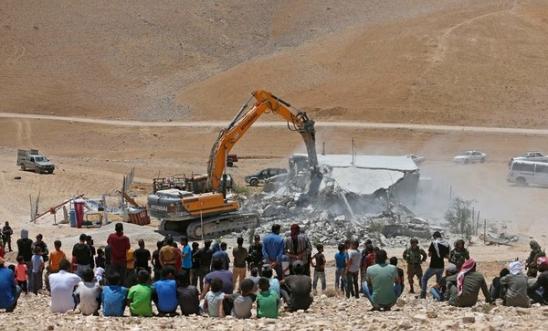
Press releases
Israel/OPT: Child detainee's home to be demolished under Israeli apartheid rule

The Israeli Supreme Court today (25 August) approved the punitive demolition of the family home of a 13-year-old Palestinian boy who has spent the past six months in pre-trial detention on unfair charges.
In February this year, Mohammed Zalabani stabbed an Israeli border police officer on a bus at a checkpoint in the Shu’afat refugee camp in occupied East Jerusalem. He was overpowered, but moments later a private Israeli security guard accidentally shot the officer dead.
Despite an autopsy confirming that it was the shooting that killed the border police officer, Mohammed Zalabani was charged with his murder and is now awaiting trial in a juvenile facility. Following the attack, the Israeli military ordered the punitive demolition of the third-floor apartment in Shu’afat where Mohammed Zalabani’s parents and three siblings – one of whom is just a toddler – live.
The Israeli human rights organisation HaMoked filed a petition against the order, but the Supreme Court rejected it.
Khulood Badawi, Amnesty International’s Campaigner on Israel and the Occupied Palestinian Territories, said:
“Today’s ruling shows how Israel’s brazen contempt for international law runs through every institution. It is also a reminder of the Supreme Court's role in enforcing apartheid against Palestinians.
“Israel’s punitive demolitions are a form of unlawful collective punishment, which constitute a war crime and a grave breach of the Fourth Geneva Convention.
“Mohammed Zalabani’s siblings and parents were not involved in the attack, but now face losing their home and being displaced due to an act of vengeance which is utterly divorced from justice and the rule of law. Meanwhile their son Mohammed, who is just a child, is in detention and facing a long sentence for a crime that he did not commit."
The prosecutor in Zalabani’s indictment acknowledged that he had acted completely alone, and that his family did not know about the attack in advance.
Punitive demolitions in the Occupied Palestinian Territories are usually accompanied by violent military raids which can cause serious damage to neighbouring homes. They sow terror throughout entire Palestinian communities and are one of the measures that Israeli authorities use to oppress and dominate Palestinians.
Demolitions used as punishment against Palestinians
Israeli authorities routinely use punitive demolitions against the relatives of Palestinians who have carried out actual or alleged attacks against Israeli forces or civilians.
The Supreme Court approves the vast majority of punitive demolition orders, arguing that they deter potential future attacks. In 2005, punitive demolitions were suspended based on the recommendation of a military committee, which found the policy did nothing to deter Palestinian attacks on Israelis. The policy was resumed in 2014, and since then hundreds of Palestinians have lost their homes.
Punitive demolitions are a form of unlawful collective punishment and constitute a grave breach of the Fourth Geneva Convention, and a war crime under the Rome Statute of the International Criminal Court. The UN Human Rights Committee and the Committee on Economic, Social and Cultural rights have called on Israel to stop the practice. Under Israeli law the minimum age of criminal responsibility is 12 years; while the UN Committee on the Rights of the Child encourages States to increase it to at least 14 years of age.